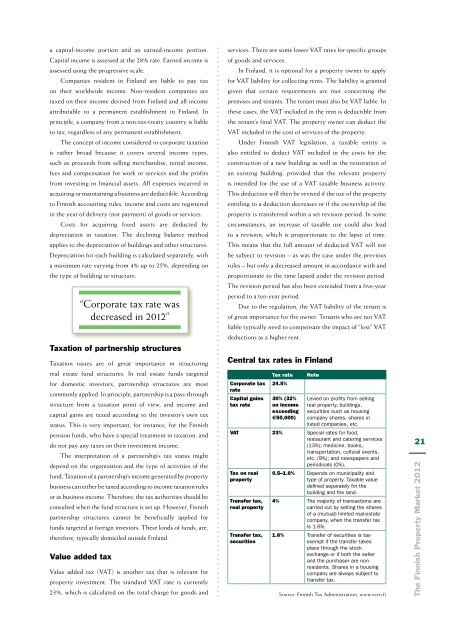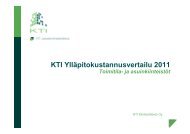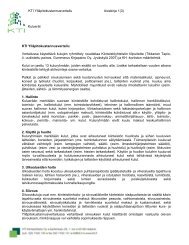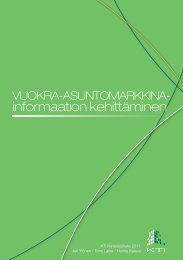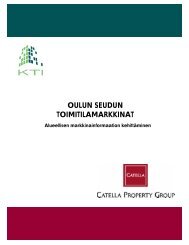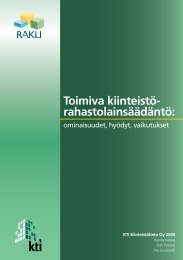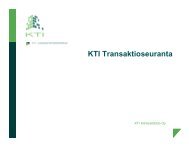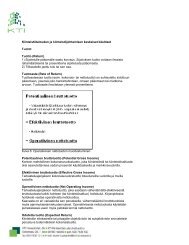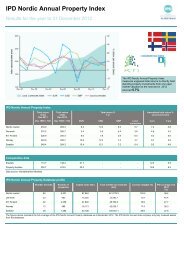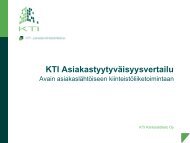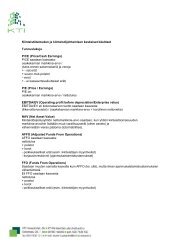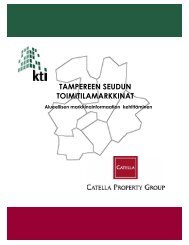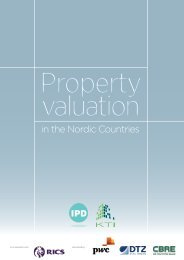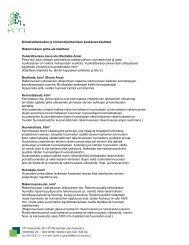The Finnish Property Market 2012 - KTI
The Finnish Property Market 2012 - KTI
The Finnish Property Market 2012 - KTI
Create successful ePaper yourself
Turn your PDF publications into a flip-book with our unique Google optimized e-Paper software.
a capital-income portion and an earned-income portion.<br />
Capital income is assessed at the 28% rate. Earned income is<br />
assessed using the progressive scale.<br />
Companies resident in Finland are liable to pay tax<br />
on their worldwide income. Non-resident companies are<br />
taxed on their income derived from Finland and all income<br />
attributable to a permanent establishment in Finland. In<br />
principle, a company from a non-tax-treaty country is liable<br />
to tax, regardless of any permanent establishment.<br />
<strong>The</strong> concept of income considered in corporate taxation<br />
is rather broad because it covers several income types,<br />
such as proceeds from selling merchandise, rental income,<br />
fees and compensation for work or services and the profits<br />
from investing in financial assets. All expenses incurred in<br />
acquiring or maintaining a business are deductible. According<br />
to <strong>Finnish</strong> accounting rules, income and costs are registered<br />
in the year of delivery (not payment) of goods or services.<br />
Costs for acquiring fixed assets are deducted by<br />
depreciation in taxation. <strong>The</strong> declining balance method<br />
applies to the depreciation of buildings and other structures.<br />
Depreciation for each building is calculated separately, with<br />
a maximum rate varying from 4% up to 25%, depending on<br />
the type of building or structure.<br />
“Corporate tax rate was<br />
decreased in <strong>2012</strong>”<br />
Taxation of partnership structures<br />
Taxation issues are of great importance in structuring<br />
real estate fund structures. In real estate funds targeted<br />
for domestic investors, partnership structures are most<br />
commonly applied. In principle, partnership is a pass-through<br />
structure from a taxation point of view, and income and<br />
capital gains are taxed according to the investor’s own tax<br />
status. This is very important, for instance, for the <strong>Finnish</strong><br />
pension funds, who have a special treatment in taxation, and<br />
do not pay any taxes on their investment income.<br />
<strong>The</strong> interpretation of a partnership’s tax status might<br />
depend on the organisation and the type of activities of the<br />
fund. Taxation of a partnership’s income generated by property<br />
business can either be taxed according to income taxation rules<br />
or as business income. <strong>The</strong>refore, the tax authorities should be<br />
consulted when the fund structure is set up. However, <strong>Finnish</strong><br />
partnership structures cannot be beneficially applied for<br />
funds targeted at foreign investors. <strong>The</strong>se kinds of funds, are,<br />
therefore, typically domiciled outside Finland.<br />
Value added tax<br />
Value added tax (VAT) is another tax that is relevant for<br />
property investment. <strong>The</strong> standard VAT rate is currently<br />
23%, which is calculated on the total charge for goods and<br />
services. <strong>The</strong>re are some lower VAT rates for specific groups<br />
of goods and services.<br />
In Finland, it is optional for a property owner to apply<br />
for VAT liability for collecting rents. <strong>The</strong> liability is granted<br />
given that certain requirements are met concerning the<br />
premises and tenants. <strong>The</strong> tenant must also be VAT liable. In<br />
these cases, the VAT included in the rent is deductible from<br />
the tenant’s final VAT. <strong>The</strong> property owner can deduct the<br />
VAT included in the cost of services of the property.<br />
Under <strong>Finnish</strong> VAT legislation, a taxable entity is<br />
also entitled to deduct VAT included in the costs for the<br />
construction of a new building as well as the restoration of<br />
an existing building, provided that the relevant property<br />
is intended for the use of a VAT taxable business activity.<br />
This deduction will then be revised if the use of the property<br />
entitling to a deduction decreases or if the ownership of the<br />
property is transferred within a set revision period. In some<br />
circumstances, an increase of taxable use could also lead<br />
to a revision, which is proportionate to the lapse of time.<br />
This means that the full amount of deducted VAT will not<br />
be subject to revision – as was the case under the previous<br />
rules – but only a decreased amount in accordance with and<br />
proportionate to the time lapsed under the revision period.<br />
<strong>The</strong> revision period has also been extended from a five-year<br />
period to a ten-year period.<br />
Due to the regulation, the VAT liability of the tenant is<br />
of great importance for the owner. Tenants who are not VAT<br />
liable typically need to compensate the impact of “lost” VAT<br />
deductions as a higher rent.<br />
Central tax rates in Finland<br />
Corporate tax<br />
rate<br />
Capital gains<br />
tax rate<br />
Tax rate<br />
24.5%<br />
30% (32%<br />
on income<br />
exceeding<br />
€50,000)<br />
Note<br />
Levied on profits from selling<br />
real property, buildings,<br />
securities such as housing<br />
company shares, shares in<br />
listed companies, etc.<br />
VAT 23% Special rates for food,<br />
restaurant and catering services<br />
(13%); medicine, books,<br />
transportation, cultural events,<br />
etc. (9%); and newspapers and<br />
periodicals (0%).<br />
Tax on real<br />
property<br />
Transfer tax,<br />
real property<br />
Transfer tax,<br />
securities<br />
0.5–1.0% Depends on municipality and<br />
type of property. Taxable value<br />
defined separately for the<br />
building and the land.<br />
4% <strong>The</strong> majority of transactions are<br />
carried out by selling the shares<br />
of a (mutual) limited real-estate<br />
company, when the transfer tax<br />
is 1.6%.<br />
1.6% Transfer of securities is taxexempt<br />
if the transfer takes<br />
place through the stock<br />
exchange or if both the seller<br />
and the purchaser are nonresidents.<br />
Shares in a housing<br />
company are always subject to<br />
transfer tax.<br />
Source: <strong>Finnish</strong> Tax Administration, www.vero.fi<br />
21<br />
<strong>The</strong> <strong>Finnish</strong> <strong>Property</strong> <strong>Market</strong> <strong>2012</strong>


